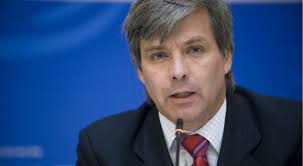By Andrew Warshaw
August 12 – Harold Mayne-Nicholls, the former Chilean FA boss who led the FIFA evaluation team for the 2018 and 2022 World Cups, has broken his long silence over his ban from the game, accusing FIFA of double-standards and of blocking his attempts to gain justice.
Infuriated by the FIFA ethics committee’s ruling last week to clear Gianni Infantino of any wrongdoing, Mayne-Nicholls says the offences he committed paled into insignificance compared with the gravity of Infantino’s alleged conduct and can’t understand why the FIFA president was treated so lightly by comparison.
Mayne-Nicholls was initially handed a seven-year ban after an email exchange came to light requesting possible work placements for his son and a nephew at the famed Aspire youth academy in Doha. Aspire was strongly linked to Qatar’s successful 2022 World Cup bid and FIFA’s ethics judging chamber took the view that Mayne-Nicholls had seriously violated his responsibilities.
Ethics judges were anxious to send out a strong message that Mayne-Nicholls, as head of the technical inspection team, had a special responsibility in terms of neutrality and that anything which could potentially endanger the independent evaluation of World Cup bidders was a serious conflict of interest.
Yet while he was guilty of gross naivety and poor judgement, of all the sanctions meted out by the ethics committee over the years, few raised as many eyebrows in terms of their draconian nature. It was little surprise when FIFA’s appeals committee ruled that ethics officials had been far too harsh and slashed the sentence to three years.
But even that verdict, Mayne-Nicholls now says, was unjust compared to ethics officials finding Infantino not guilty of a string of far more serious allegations, most notably taking unauthorised private flights to visit the Pope, Russian president Vladimir Putin and the Emir of Qatar.
“I have nothing to say about Infantino himself but that decision made me totally mad,” Mayne-Nicholls told Insideworldfootball. “How can you say that in my case there were conflicts of interests over a couple of emails which I admit I sent but which did not result in anything, and that in this case – where something actually DID happen – there was no conflict of interest?”
“Can someone really tell me how come there are no personal benefits when you take these kinds of flights on a FIFA mission compared with my case when I was seeking education, prepared to pay yet was found guilty of something that never happened? I would like (chief ethics judge) Mr (Hans-Joachim) Eckert and his team to explain this to me. I hope it is not because Infantino is FIFA president. If that is the reason for the different treatment, it means the law is not the same for everyone and that means the end of fairness.”
Citing other cases, including that of former German football boss Wolfgang Niersbach and his role in the infamous alleged €6.7 million vote-buying slush fund over Germany’s 2006 World Cup bid, Mayne-Nicholls also questioned whether co-operating with ethics officials was in fact counter-productive.
“Wolfgang is a good friend but he got one year for non-cooperation over a case involving more than €6 million. Angel Villar Llona did not co-operate over 2018 and 2022 and just got off with a warning. Yet I co-operated and got seven years. The message seems to be that my mistake was bigger than the others. Perhaps it is better not to co-operate. There is simply no proportionality any longer in the ethics committee’s decisions. They no longer have the credibility they once had.”
Mayne-Nicholls is also increasingly frustrated that, despite having had his ban reduced to three years in April, he has still not received the written grounds from FIFA’s appeals committee without which he cannot take his case to the Court of Arbitration for Sport.
He believes the reason for the delay is that FIFA knows he could get his ban overturned, or at least further reduced. Questions could certainly be asked as to why it has taken so long to provide the relevant details when so many other cases have been processed far more quickly.
“Of course we want to go to CAS but I have to go with the reasons and I have still not got these after 125 days despite repeated requests. Why is this?” Mayne-Nicholls asked. “I worked for FIFA for almost 20 years and it’s very frustrating.”
An emailed statement from FIFA to Insideworldfootball provided a less than convincing explanation. “The verdict by the appeals committee was taken in April 2016 and legal proceedings are still ongoing. In the disciplinary and ethics codes there is no reference to a specific deadline in terms of when written grounds should be submitted,” it said.
In the meantime, Mayne-Nicholls admits his ban is seriously hurting his career prospects and his business life. “I have been unable to run for a string of positions including Chilean FA president again, CONMEBOL president, even FIFA president. Nor can I run for president of my local club.”
Worse still, he says, it has affected his football foundation designed to tackle obesity and get more kids playing sport. “I used to give motivational lectures all over the country to raise funds but this has been hit too.”
Contact the writer of this story at moc.l1745177870labto1745177870ofdlr1745177870owedi1745177870sni@w1745177870ahsra1745177870w.wer1745177870dna1745177870

